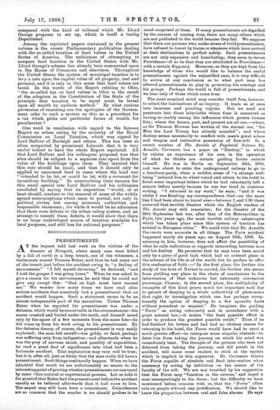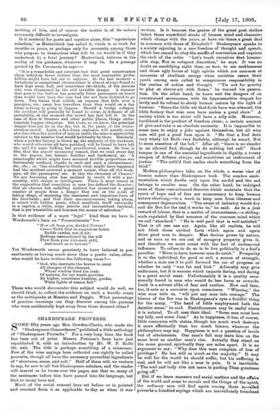PRESENTIMENTS.
A T the inquest held last week on the victims of the disaster at Newport, where many men ,were killed by a fall of earth in a deep trench, one of the witnesses, a Um" berman named Thomas Baker, said that he had come out of the trench just before the accident owing to "a feeling of nervousness." "I felt myself shivering," he declared, "and I told the ganger I was going home." When he was asked to give a reason for his nervousness, he said that he could not give any except this : "God on high must have warned me." We wonder how many times we have read after serious accidents that somebody had a presentiment that an accident would happen. Such a statement seems to be an almost indispensable part of the narratives. Unless Thomas Baker when he reported his presentiment was under a delusion, which would be conceivable in the circumstances—his mates crushed and buried under the earth, and himself saved only by the space Of a few moments from the same fate—he did come up from his work owing to his presentiment. By the delusion theory, of course, the presentiment is very easily explained: the man felt unwell—was giddy, or faint, perhaps was suffering only from indigestion—and afterwards when he was the prey of nervous shook, and possibly of superstition, lie read a great deal of significance into what had been a fortunate accident. That explanation may very well be true; but it is, after all, just as likely that the man really did have a presentiment. Such things continually happen. When we have admitted that much we are unfortunately no nearer to the interesting point of proving whether presentiments are conveyed by some eltm-natural or-supernatural process. Let us take it for granted that Baker had his presentiment before the accident exactly as he believed afterwards that it had .come to him. The sequel may still. have been, a coincidence. - Coincidences are so common that the wonder is we should profess to be
much surprised at them. If many presentiments are dignified by the success of coming true, there are many others which are not published to the world because they fail. We suppose that there are persons who, under stress of vivid presentiments, have refused to travel by trains or steamers which have arrived at their destinations in perfect safety. Such presentiments are not only expensive and humiliating; they seem to invest Providence—if so be that they are attributed to Providence— with a certain flippancy. Moreover, as they are kept from the knowledge of those who would like to balance the useful presentiments against the unjustified ones, it is very difficult to arrive at any conclusion as to what part man has allowed presentiments to play in governing his comings and' his goings. Perhaps the world is full of presentiments, and we hear only of those which come true.
The most sceptical mind may consider itself free, however. to admit the fascinations of an inquiry. It leads us at once into immense and puzzling regions. But we need not penetrate into those labyrinths where time is conceived in having no reality among the influences which govern human fate ; where the future, past, and present are all one,—where, as Sir Thomas Browne has written of the eternal one, "for Him the Last Trump has already sounded"; and where destiny seems necessarily to conflict with man's great solace and weapon and instinctive possession of free-will. III a recent number of The Annals of Psychical Science Dr. Arnaldo Cervesa.to has a paper on "Destiny," iu which he relates an experience of his own in the operation of what lie thinks are certain guiding forces outside himself. He was in Berlin on September 26th, 1908, and was about to enter the underground railway to go to a luncheon-party, when a sudden sense of "a strange well- being " induced him to wheel round- and return to his hotel to finish some important letters which he had reluctantly left a minute before merely because he was too tired to continue writing. "I returned to my work," he says; "and it was whilst I was finishing my correspondence that—on the same line I had been about to travel over—between 1 and. 1.30 there occurred that terrible disaster which the English readers Of The Annals may still remember; for the disaster of 'the' 26th September last was, after that of the Metropolitan in Paris, two years ago, the most terrible railway catastrophe which has taken place since this system of traction has existed in European cities." We could wish that Dr. Arnaldo CervesAto were accurate in all things. The Paris accident happened nearly six years ago, on August 10th, 1903. In- accuracy in him, however, does not affect the possibility of what he calls indications or rapports interceding between man and his destiny. He perceives that he may have been saved only by a piece of good luck which had no ordered place in the scheme of his life or of the world, but he prefers to offer this confession of faith :—"In the first place, the further the study of the laws of Nature is carried, the further she seems from yielding any place in the chain of conclusions to the intervention of that unknown but extremely convenient personage. Chance ; in the second place, the, multiplicity of examples of this kind grows much too important each day to permit of denying to a whole collectivity of phenomena that right to investigation which one has perhaps' excep- tionally the option of denying to a few sporadic facts without precedent or sequent." He imagines the guiding "Force" as acting coherently and in accordance with a great natural law,—it makes "the least possible effort in order to produce the greatest possible result?' Thus, if lie bad finished his letters and had had no obvious reason for returning to his hotel, the Force would have had to exert -a much greater effort—to :interpose some singular obstacle—to deter him from taking the journey on which hie mind was immediately bent. The thought of the persons who were not deterred from taking the journey, and did perish in the accident, will cause some readers to stick at the egoism which is implicit in this argument. Dr. Cervesato thinks the Force capable of absolute and final intervention when necessary by acting by inhibition on the centre of the faculty of the will. We are not troubled by his suggestion that the Force may "function in the reverse," and impel a man unsuspectingly to his doom; but the difficulty we have mentioned before remains with us, that the ." Force", often acts on people-without any justification. We .should like to know the proportion between real and false alarms. He says
nothing of this, and of course the matter is of its nature
extremely difficult to investigate.
Is it material for poets and mystics alone, this " mysterious selection," as Maeterlinck has called it, which is at work for months or years, or perhaps only for moments, among those who propose to themselves what will be (or would be if they undertook it) a fatal journey? Maeterlinck believe in the reality of the guidance, whatever it may be. In a passage
quoted by Dr. Cervesato he says :—
" It is a remarkable and constant fact that great catastrophes claim infinitely fewer victims than the most reasonable proba- bilities might have led one to suppose. At the last moment a fortuitous or exceptional circumstance is abtiost always found to have kept away half, and sometimes two-thirds, of the persons who were threatened by , the still invisible danger. A steamer that goes to the bottom has generally fewer passengers on board than would have been the case had she not been destined to go down. Two trains that collide, an express that falls over a precipice, etc., carry less travellers than they would on a day when nothing is going to happen. Should a. bridge collapse, the accident will generally be found to occur, in defiance of all probability, at the inornent the crowd has just left it. In the case of fires in theatres and other public places, things unfor- tunately happen otherwise. But there, as we know, the principal danger does not lie in the fire, but in the panic of the terror- stricken crowd. Again, a fire-damp explosion will usually occur at a time when the number of minors biside the mine is appreciably inferior to the number that *ould habitually be there. Similarly, when a powder factory is blown up, the majority of the workmen, who would otherwise all have perished, will be fouud to have left the mill for some trifling, but providential, reason. So true is this, that the almost unvarying remark, that we read every day in the papers, has become familiar and hackneyed, as: • A catastrophe which might have assumed terrible proportions was fortunately confined, thanks to such and such a circumstance,' etc., etc.; or, 'One shudders to think what might have happened had the accident occurred a moment sooner, when all the work- men, all the passengers,' etc. Is this the clemency of Chance ? We are becoming ever less inclined to credit it with a per- sonality, with design or intelligence. There is more reason in the supposition that something in man has defined the disaster ; that an obscure but unfailing instinct has preserved a great number of people from a danger that was on the point of taking shape, of assuming the imminent and imperious form of the Inevitable; and that their unconsciousness, taking alarm, is seized with hidden panic, which manifests itself outwardly in a caprice, a whim, some puerile and inconsistent incident, that is yet irresistible and becomes the means of salvation."
Is that evidence of a more "legal" kind than we have in Wordsworth's lines on "Presentiments" ?— " How oft from you, derided Powers !
Comes Faith that in auspicious hours Builds castles, not of air: Bodings misanctioned by the will' Flow from your visionary skill, And teach us to beware."
Yet Wordsworth seems genuinely to have believed in pre- sentiments as having much more than a poetic value, other- wise would he have written the following verse ?— " God, who instructs the brutes to scent All changes of the element,
Whose wisdom fixed the scale Of natures, for our wants provides By higher, sometimes humbler, guides, When lights of reason fail."
Those who would documenter this subject would do well, we should think, to collect the evidence on such a terrific event as the earthquake at Messina and Reggio. What percentage of genuine warnings can they discover among the persons who were accidentally kept away from those doomed cities ?









































 Previous page
Previous page